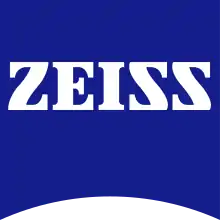Carl Zeiss SMT
Carl Zeiss SMT GmbH comprises the Semiconductor Manufacturing Technology business group of ZEISS and develops and produces equipment for the manufacture of microchips. The company is majority owned by Carl Zeiss AG, with a 24.9% minority stake by ASML Holding.[2]
 | |
| Type | GmbH (Germany) |
|---|---|
| Industry | Semiconductor manufacturing technology |
| Founded | 2001 |
| Headquarters | Oberkochen, Germany |
Key people |
|
| Revenue | € 2.757 billion (2021/22)[1] |
| Website | www |
The headquarters of the group are located in Oberkochen, Germany, with additional sites in the German cities Jena, Wetzlar, Rossdorf, Dublin (USA), Danvers (USA) and Bar Lev (Israel). As of September 2022, the total workforce in the seven sites is approximately 6,200.[3]
History
In 1968, ZEISS supplied the optics for a circuit printer for the first time.[4] About nine years later, the world's first predecessor to a modern wafer stepper, produced by David Mann (later GCA), was equipped with optics from Carl Zeiss.[5] In 1983, the first lithography optics from ZEISS were used in a wafer stepper from Philips. Just under ten years later, ZEISS and Philips carve-out company ASML entered into a strategic partnership.[6] The Semiconductor Manufacturing Technology business group was established by ZEISS in 1994. Carl Zeiss SMT GmbH and its subsidiaries Carl Zeiss Laser Optics GmbH and Carl Zeiss SMS GmbH followed in 2001. The construction of the Semiconductor Manufacturing Technology plant of ZEISS in Oberkochen started the same year, and was completed in 2006.[7] In 2010, the semiconductor area achieved revenues of over a billion euros for the first time.[8] Effective October 2014, the subsidiaries Carl Zeiss Laser Optics and Carl Zeiss SMS GmbH were merged into Carl Zeiss SMT GmbH.
Product areas
Semiconductor manufacturing optics
The ZEISS business group develops and produces optics for semiconductor production. Its core business is lithography optics that form the centerpiece of a wafer scanner. The development and manufacture of projection optics and the development of illumination systems take place at the Oberkochen site, while the production of most types of illumination system is located in Wetzlar. In addition to lithography optics, the business group is specialized in numerous other optical products, including optical components for lasers that are used as light sources for lithographic systems.
Photomask systems
This area develops and manufactures systems that analyze and repair defects on photomasks and measure and optimize defined mask properties. The photomask contains all the structure information that will be imaged on the wafer with light.
Process control solutions
This product unit develops and manufactures process control solutions to obtain and analyze relevant information (such as microchip volumes) for logic and memory chip production. This enables the semiconductor industry to meet its challenges for the next generation of elements.
References
- "Annual Report 2021/22 ZEISS Group" (PDF). Carl Zeiss AG. Retrieved 2023-03-29.
- "ZEISS and ASML Strengthen Partnership for Next Generation of EUV Lithography". www.asml.com. Retrieved 2021-05-11.
- "Annual Report 2021/22 ZEISS Group" (PDF). Carl Zeiss AG. Retrieved 2023-03-29.
- Hennings, K. (1967). "Technologische Probleme der Mikrominiaturisierung (Planartechnik)". technica (in German): 2337–2341.
- Rai-Choudhury, Prosenjit (Ed.) (1997). Handbook of Microlithography, Micromachining, and Microfabrication. Volume 1: Microlithography. SPIE Press. p. 83.
- Benschop, Jos; Rupp, Wolfgang. "Partnership ASML" (PDF). Archived from the original (PDF) on 2014-02-01. Retrieved 2014-04-04.
- Paetrow, Stephan (2011). Birds of a Feather. 20 Years of Reunification at Carl Zeiss. Hanseatischer Merkur, Hamburg. p. 111.
- "Facts & Figures". Carl Zeiss SMT GmbH. Retrieved 2014-07-14.
Further reading
Carl Zeiss is a top supplier of critical subsystems, in: WaferNEWS, July 7/2003, pp. 4
External links
- ZEISS Website
- Carl Zeiss Foundation (in German)
- Carl Zeiss SMT